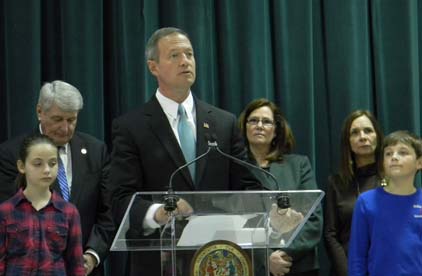SEVERNA PARK – Maryland will not rest on its laurels, Gov. Martin O’Malley said Thursday in celebrating Maryland’s fifth, first-place, national ranking in education at one of the state’s Blue Ribbon schools.
O’Malley came to Jones Elementary School, which was named a Maryland and national Blue Ribbon school in 2003, where he was greeted by dozens of excited fifth-graders and educators.
“We’re not done, but it is gratifying when a national group in evaluating with some objective measures and standards ranks us No. 1,” O’Malley said, stressing that the state must improve technology and more carefully calibrate education to the job market.
“The more a person learns, the more a person earns…there is no more important investment that we make than the investment we make in children,” O’Malley said, joined by officials from the Maryland State Education Association, House Speaker Michael Busch, who is a teacher, and other educators.
The state’s school system on Thursday was awarded a B+ grade in Education Week’s annual “Quality Counts” state report card, beating out states such as Virginia, New York and Massachusetts to take the top spot for the fifth year in a row.

The “Quality Counts” assessment evaluates state public education on six factors: chance for success; K-12 achievements; transitions and alignment; the teaching profession; school finance; and standards, assessments and school accountability.
A unique aspect of the report card is that it measures both education policy and student performance, said Sterling Lloyd, a senior research associate with Editorial Projects in Education, which conducts the analysis. “We don’t just look at policy initiatives, but we also look at student outcomes like test scores and graduation rates,” Lloyd said.
Maryland’s strongest category was “transitions and alignment,” in which the state scored 96.4. O’Malley attributed that outcome to the state’s public policy strides, including the implementation of minimum requirements for high school graduation and the P-20 Leadership Council to ensure graduating students are prepared for college.
The state still must face course redesigns and closing of achievement gaps.
While the ranking is certainly an accomplishment, O’Malley stressed the challenges ahead and the work that needs to be done, including improving technology and technical education in classrooms to align students’ skills with the job market.
The state is working on improving everything from policies to the curriculum, said Betty Weller, president of the Maryland State Education Association. Ranking first is only a motivator, she said. “We can always look at education and find room for improvement. Things change. Education is not a stagnant profession, so we see it as a motivator to keep going and to certainly be No. 1,” Weller said.
Maryland’s success can be attributed to strong academic achievements paired with policy initiatives, Lloyd said. Typically, states only implement aggressive policies to spur improvement when they have low performance, he said.
“The residents of the state can feel encouraged that its students are competitive with their peers in other states in terms of their level of preparation for the work force and for college and in terms of their scores on math and reading tests,” Lloyd said. “Maryland gets a B, so there’s room for improvement.”


You must be logged in to post a comment.